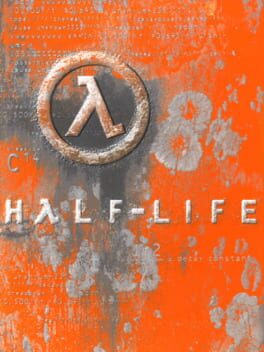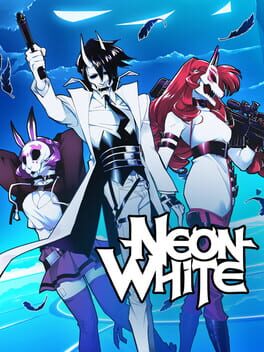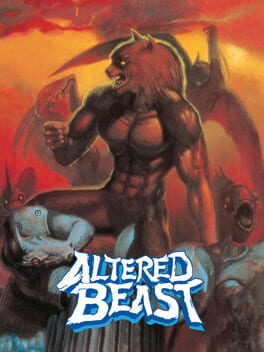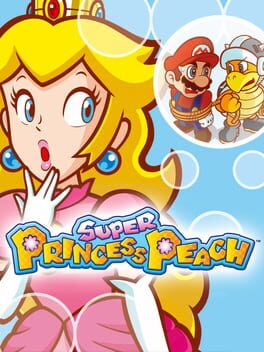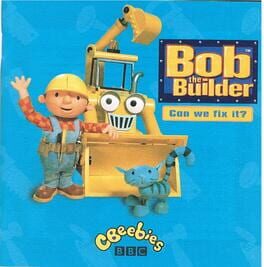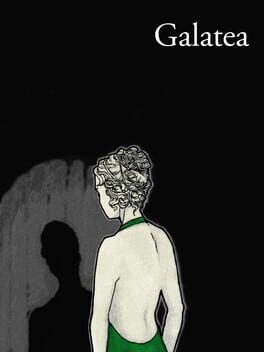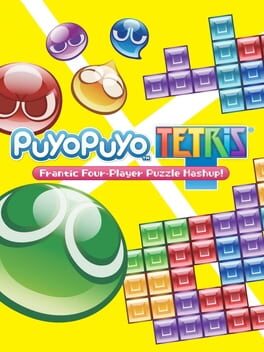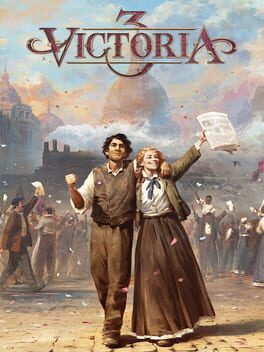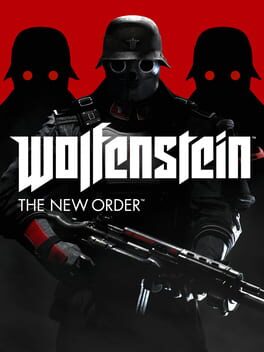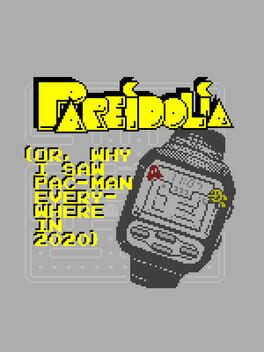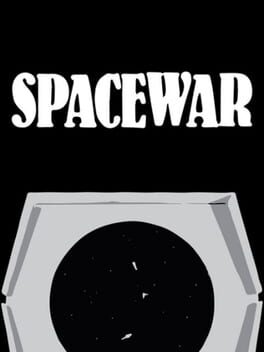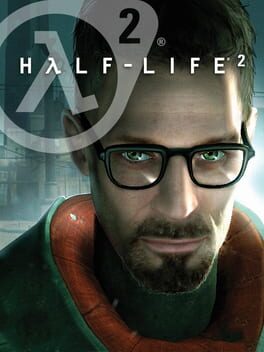Whom
BACKER
1998
2022
Neon White is a tragic would-be masterpiece held back by its unrelenting irony-poisoned rejection of anything genuine or friendly, along with completely wrecking its initially excellent mechanical design the second it tries to ramp up the difficulty.
In a first person movement based game, the difficulty and reward comes from the depth of that movement itself, in mastering it and squeezing out everything those mechanics allow. The execution barrier on something like a surf map in Counter-Strike or simply competently playing a match of Quake is a large part of what gives those their richness. A high skill floor does not necessarily mean a high ceiling will come with it, but it's certainly much more likely and works out in these cases. Neon White tries to simplify the kind of satisfaction one gets from mastery of movement to something every player can enjoy, and at first that works. For the first few missions, the easy mode versions of surfing, sticky jumping, and other classic movement options make for compelling levels where it is genuinely fun to compete with your friends and improve. Soon, though, the mechanics lose their luster as you realize how little there is to them. Regardless of angle, all explosions will send you directly up where you want them to, and everything is generally placed in such an easy to clear manner that it becomes mindless. There is simply nowhere to go, and improvement consists mostly of cutting corners and performing actions more smoothly.
This doesn't last forever, though, and eventually Neon White wants to make clearing levels more difficult. At first you cheer, until you realize how they do that. Their basic movement options are so devoid of depth that they just gave up on getting anything else out of them, and instead just layer mechanic on mechanic, hide enemies all over the place, and ask you to route that out. So as you progress, you spend more and more time looking around for what you need and planning things out so that by the time you're doing actual runs and shaving off time, you just want to move on to something else. One might say that this issue mirrors actual speedrunning, where the fast path and how to complete all objectives while going down it is often not clear. That's certainly true, but routing and then grinding out a level in a speed game usually comes after playing casually and genuinely enjoying the space without trying to move through it fast. Getting familiar with the space is then a natural process during casual playthroughs, but you can't do that there. There is nothing else to these levels other than speedrunning. No storytelling or puzzle solving or anything else that makes us love games. There's no hook.
In that way, it ends up feeling a lot like 2D Sonic: utterly joyless restriction of movement makes it so that to actually have any fun, you first need to play through a level several times and get good. Getting through is not hard, but it sure is tedious. The fun comes after the grind and the game doesn't even make an attempt at hooking you in to get you to that point.
The less said about the narrative, the better. Awful anime dub-tier voice acting drags down characters already so utterly insufferable and internet-poisoned with the most mean-spirited "SIMP POGGERS GURO XD" bullshit you've ever seen. If you find anything cute or fun, it will soon be torn down and stomped on.
Can we undo the Danganronpafication and Personafication of anything weeby? Weebs deserve better.
In a first person movement based game, the difficulty and reward comes from the depth of that movement itself, in mastering it and squeezing out everything those mechanics allow. The execution barrier on something like a surf map in Counter-Strike or simply competently playing a match of Quake is a large part of what gives those their richness. A high skill floor does not necessarily mean a high ceiling will come with it, but it's certainly much more likely and works out in these cases. Neon White tries to simplify the kind of satisfaction one gets from mastery of movement to something every player can enjoy, and at first that works. For the first few missions, the easy mode versions of surfing, sticky jumping, and other classic movement options make for compelling levels where it is genuinely fun to compete with your friends and improve. Soon, though, the mechanics lose their luster as you realize how little there is to them. Regardless of angle, all explosions will send you directly up where you want them to, and everything is generally placed in such an easy to clear manner that it becomes mindless. There is simply nowhere to go, and improvement consists mostly of cutting corners and performing actions more smoothly.
This doesn't last forever, though, and eventually Neon White wants to make clearing levels more difficult. At first you cheer, until you realize how they do that. Their basic movement options are so devoid of depth that they just gave up on getting anything else out of them, and instead just layer mechanic on mechanic, hide enemies all over the place, and ask you to route that out. So as you progress, you spend more and more time looking around for what you need and planning things out so that by the time you're doing actual runs and shaving off time, you just want to move on to something else. One might say that this issue mirrors actual speedrunning, where the fast path and how to complete all objectives while going down it is often not clear. That's certainly true, but routing and then grinding out a level in a speed game usually comes after playing casually and genuinely enjoying the space without trying to move through it fast. Getting familiar with the space is then a natural process during casual playthroughs, but you can't do that there. There is nothing else to these levels other than speedrunning. No storytelling or puzzle solving or anything else that makes us love games. There's no hook.
In that way, it ends up feeling a lot like 2D Sonic: utterly joyless restriction of movement makes it so that to actually have any fun, you first need to play through a level several times and get good. Getting through is not hard, but it sure is tedious. The fun comes after the grind and the game doesn't even make an attempt at hooking you in to get you to that point.
The less said about the narrative, the better. Awful anime dub-tier voice acting drags down characters already so utterly insufferable and internet-poisoned with the most mean-spirited "SIMP POGGERS GURO XD" bullshit you've ever seen. If you find anything cute or fun, it will soon be torn down and stomped on.
Can we undo the Danganronpafication and Personafication of anything weeby? Weebs deserve better.
1988
I have to wonder what this game feels like to players who aren't Souls vets. So many of its decisions are fueled by its relentless attempts to counter the mindset and playstyle Dark Souls teaches its players. The final boss even says to your face: "Hesitation is defeat," clearly stating the mechanical thesis of the game. You attack, attack, and attack while deflecting sometimes...other options like running away, blocking, and dodging are niche mechanics for very few situations, and if you use them in general combat you WILL have a hard time.
This took me quite a while to complete. It's hard to tell due to the amount of idle time, but I think Sekiro took me about as long as my first run through Dark Souls.
I do feel somewhat limited in the intelligent things I can say about this, because so much of what's floating in my head is comparisons to Souls and what makes those the greatest pieces of art in existence. I still don't feel ready to fully tackle those, and that sort of leaves Sekiro hanging as well. Oh well, for now I'll leave it at nearly every element of this game being the most brilliant thing I've ever seen.
Played on Linux via Proton.
This took me quite a while to complete. It's hard to tell due to the amount of idle time, but I think Sekiro took me about as long as my first run through Dark Souls.
I do feel somewhat limited in the intelligent things I can say about this, because so much of what's floating in my head is comparisons to Souls and what makes those the greatest pieces of art in existence. I still don't feel ready to fully tackle those, and that sort of leaves Sekiro hanging as well. Oh well, for now I'll leave it at nearly every element of this game being the most brilliant thing I've ever seen.
Played on Linux via Proton.
2005
Super Princess Peach is slow. It's so slow. Peach crawls across the screen and there's nothing you can do about it, short of using occasional slides and extra energy for the crying vibe power to make it a little more bearable. 2D Mario games can do a lot wrong, but they typically make up for it by at least being smooth and snappy enough that the simple act of moving through levels is fun, and they fuck that up here. I like this game and I'm nostalgic for it, but playing through it to the ending as an adult, I can't say it's nearly as good as it is in my memories.
The vibes feel incredibly under-utilized and like they figured cool levels would flow out of them in a way that just never happened. You never feel creative or like you've solved a puzzle, you just stop and press the button on the touch screen that lets you get past the obstacle. It's really a shame, because with this game's slower and more deliberate pace along with more fleshed-out moves...what else are those for, if not new and creative kinds of encounters that require a little more thought? I'm likely going to write another short review if I get around to do the harder levels that unlock in the post-game, but I've seen no real indication that they had any fleshed-out ideas for what to do with Peach's (very cool!) unique abilities. Often it's as if the levels contain doors of four different colors and the player has the incredibly difficult task of tapping on the corresponding color on the second screen.
The feminist objections to Super Princess Peach are maybe what the game is most remembered for nowadays, and though the vibes don't bother me much, the criticism is plenty valid. It's a tone-deaf choice that makes it occupy a strange place in history. It sucks that this whole special game dedicated to Peach is based around extreme emotions. What bothers me more than that, though, is the insulting ease and spoodfeeding that go far beyond Mario norms, even beyond NSMB norms. Every single obstacle has a tutorial block telling the player exactly what to do over and over. These are optional, thank god, but they allow NO room for ambiguous goals or really thought of any kind. This includes bosses, where every single one is preceded by a message describing in-detail how to defeat them. I'm not sure if Nintendo is deliberately talking down to and expecting nothing of the young girls this game was meant for or if their level design was so bad at signalling what to do that they had to stick signs everywhere pointing you around. Either way, it sucks.
Why didn't you tell me I needed to collect every toad? I sped through thinking they were just another collectible but you need every single one, so I ended up having to go back through half the levels in the game just to finish. Painfully easy levels are one thing, but going through them again really soured me on this right at the end. It doesn't help that the bowser fight fucking sucks and doesn't require even the little bits of problem-solving that did exist in the rest of the game.
Obviously I'm frustrated as hell with Super Princess Peach and it's not as good as I remembered, but there still is a lot to like! It looks so cheery and Peach's animations are gorgeous and fluid. Bowser's bi! Peach is a badass, woo! It's a lot of fun seeing her still be a very traditionally feminine princess-type and also whipping everyone's asses with an umbrella. The floating feels good! The little dream sequences between worlds are adorable! This one is still solid, but it's far from the best Mario platformer. But it's another nostalgic childhood game beaten, and that always feels great.
The vibes feel incredibly under-utilized and like they figured cool levels would flow out of them in a way that just never happened. You never feel creative or like you've solved a puzzle, you just stop and press the button on the touch screen that lets you get past the obstacle. It's really a shame, because with this game's slower and more deliberate pace along with more fleshed-out moves...what else are those for, if not new and creative kinds of encounters that require a little more thought? I'm likely going to write another short review if I get around to do the harder levels that unlock in the post-game, but I've seen no real indication that they had any fleshed-out ideas for what to do with Peach's (very cool!) unique abilities. Often it's as if the levels contain doors of four different colors and the player has the incredibly difficult task of tapping on the corresponding color on the second screen.
The feminist objections to Super Princess Peach are maybe what the game is most remembered for nowadays, and though the vibes don't bother me much, the criticism is plenty valid. It's a tone-deaf choice that makes it occupy a strange place in history. It sucks that this whole special game dedicated to Peach is based around extreme emotions. What bothers me more than that, though, is the insulting ease and spoodfeeding that go far beyond Mario norms, even beyond NSMB norms. Every single obstacle has a tutorial block telling the player exactly what to do over and over. These are optional, thank god, but they allow NO room for ambiguous goals or really thought of any kind. This includes bosses, where every single one is preceded by a message describing in-detail how to defeat them. I'm not sure if Nintendo is deliberately talking down to and expecting nothing of the young girls this game was meant for or if their level design was so bad at signalling what to do that they had to stick signs everywhere pointing you around. Either way, it sucks.
Why didn't you tell me I needed to collect every toad? I sped through thinking they were just another collectible but you need every single one, so I ended up having to go back through half the levels in the game just to finish. Painfully easy levels are one thing, but going through them again really soured me on this right at the end. It doesn't help that the bowser fight fucking sucks and doesn't require even the little bits of problem-solving that did exist in the rest of the game.
Obviously I'm frustrated as hell with Super Princess Peach and it's not as good as I remembered, but there still is a lot to like! It looks so cheery and Peach's animations are gorgeous and fluid. Bowser's bi! Peach is a badass, woo! It's a lot of fun seeing her still be a very traditionally feminine princess-type and also whipping everyone's asses with an umbrella. The floating feels good! The little dream sequences between worlds are adorable! This one is still solid, but it's far from the best Mario platformer. But it's another nostalgic childhood game beaten, and that always feels great.
2000
I want to come back to Galatea several times in the future, as it feels like there's enough meat here to last forever. I reached several endings, one of which I found some kind of satisfaction in, but I know there's many more. I looked into others talking about it and there was so much that it felt like they were talking about a different piece entirely. This game is entirely one conversation, and an incredibly deep and long one at that. That said, the parser has its limits. For the most part, all I can do are ask and tell about concepts, which feels reductive and adds a degree of artificiality that the brilliant writing can't seem to escape.
I live for conversations in games. My favorite kind of power fantasy is one of social competence, of using words and expressing emotions so effectively that I can learn about and help every decent person I meet. Normally the amount I can satisfy this fantasy comes down to technical competence and the interest a game has in deep conversation: either the conversations are sufficiently deep to give me that reward, or they aren't. There's no doubt that the conversation that makes up Galatea is deep...it's probably the most involved one I've ever encountered in games / IF, but it doesn't give me that satisfaction. Or rather, it does give me that satisfaction, but it also makes me examine what I'm actually feeling there.
I don't feel empowered by speaking to Galatea and I don't feel kind either. I feel invasive. I feel disrespectful. I feel like an emotional tourist. In the wake of Undertale, the last few years of games have been marked by much greater interest in the player and their pleasures and motivations. What's so compelling about this much earlier example of that interest is that it tries to tackle speech, a mechanic where the real-life counterpart is infinitely complicated and no model can capture the entirety of how it functions. Developers have largely given up, letting conversation be deep and branching and rewarding, but never natural.
Whereas Undertale emotionally punishes players for mindlessly and unfeelingly following the trail of content for the sake of completion, Galatea does the same with your own curiosity. Making conversational missteps feels awful and changes where that conversation can even go. When asking about mundane aspects of her life, you get the feeling that you're the gawker, you're just interacting with Galatea as a piece of art, as an exhibit in the gallery. When asking about something sensitive, you've got to balance your desire to know with the potential to hurt her, but also with the possibility for a therapeudic talk. These are the complexities that make real life conversation hard, the walls that keep us from fully understanding and hearing out the people around us. Conversation is risky, and I've never seen that mirrored in any interactive art other than this. This is a model for conversation that does not rely on exhausting every possible speech option, a revolutionary shift of focus on its own.
Shit, this is just begging for a feminist reading. The interactivity of games and especially interactive fiction goes far beyond the issues of, say, voyeurism in film. Yes, there is watching and all the complex politics that come along with that: Galatea is presented as a statue in a gallery. We're invited to look at and speak to her because she is an object of interest, a novelty. The politics of looking are ever-present. But interactivity adds layer upon layer upon layer to the complexity of where the player gets enjoyment. Teach someone to play parser games, and you'll quickly see the delight in invasion and free choice come out in obscene ways: TOUCH this character, KISS that character, FUCK another one. Parser-based IF has long been better than graphical games at showing consequences of these actions (or not allowing the player to do them and scolding them with their subconscious), but we are absolutely forced to engage with these questions in this piece.
The parser here is simple, with the HELP command explicitly stating that the vast majority of commands have been disabled, what's left being sensory commands, commands of physical touch, TELL, and ASK. What do I do if I want to give Galatea a hug and comfort her? ASKing doesn't produce a relevant result. Modifiers are rare. My choices are to HUG her or not to. To KISS (and where to kiss) or not to. The tools I'm given are limiting. The tools games give us are always limiting.
Point is, you feel gross. Looking feels gross. Prying feels gross. Touching feels gross. Comforting feels gross. Is there any way for me, as a player, to interact with this woman in a way that isn't broken on some level, that isn't generating pleasure through the power imbalance of me being a human being and her being a program with a particular sequence of commands which make her spill some feeling or fact about her life? I don't think there is. By being one of the purest conversation simulations in a game, Galatea justifies the relative simplicity and abstraction in typical game speech systems. No matter how much care is taken to be respectful and give a character agency, they are part of a computer program. No matter what we do, the player is extracting pleasure from their position of power over the NPCs around them. All we can do is make ourselves aware of this dynamic, and go back to our simplified Fallout conversations...and take a little more care not fall into the trap of exhausting a list of options.
I dunno, my thoughts are so scattered. There's SO much going on here. It's mind-boggling.
---
Try asking Galatea about yourself several times.
I live for conversations in games. My favorite kind of power fantasy is one of social competence, of using words and expressing emotions so effectively that I can learn about and help every decent person I meet. Normally the amount I can satisfy this fantasy comes down to technical competence and the interest a game has in deep conversation: either the conversations are sufficiently deep to give me that reward, or they aren't. There's no doubt that the conversation that makes up Galatea is deep...it's probably the most involved one I've ever encountered in games / IF, but it doesn't give me that satisfaction. Or rather, it does give me that satisfaction, but it also makes me examine what I'm actually feeling there.
I don't feel empowered by speaking to Galatea and I don't feel kind either. I feel invasive. I feel disrespectful. I feel like an emotional tourist. In the wake of Undertale, the last few years of games have been marked by much greater interest in the player and their pleasures and motivations. What's so compelling about this much earlier example of that interest is that it tries to tackle speech, a mechanic where the real-life counterpart is infinitely complicated and no model can capture the entirety of how it functions. Developers have largely given up, letting conversation be deep and branching and rewarding, but never natural.
Whereas Undertale emotionally punishes players for mindlessly and unfeelingly following the trail of content for the sake of completion, Galatea does the same with your own curiosity. Making conversational missteps feels awful and changes where that conversation can even go. When asking about mundane aspects of her life, you get the feeling that you're the gawker, you're just interacting with Galatea as a piece of art, as an exhibit in the gallery. When asking about something sensitive, you've got to balance your desire to know with the potential to hurt her, but also with the possibility for a therapeudic talk. These are the complexities that make real life conversation hard, the walls that keep us from fully understanding and hearing out the people around us. Conversation is risky, and I've never seen that mirrored in any interactive art other than this. This is a model for conversation that does not rely on exhausting every possible speech option, a revolutionary shift of focus on its own.
Shit, this is just begging for a feminist reading. The interactivity of games and especially interactive fiction goes far beyond the issues of, say, voyeurism in film. Yes, there is watching and all the complex politics that come along with that: Galatea is presented as a statue in a gallery. We're invited to look at and speak to her because she is an object of interest, a novelty. The politics of looking are ever-present. But interactivity adds layer upon layer upon layer to the complexity of where the player gets enjoyment. Teach someone to play parser games, and you'll quickly see the delight in invasion and free choice come out in obscene ways: TOUCH this character, KISS that character, FUCK another one. Parser-based IF has long been better than graphical games at showing consequences of these actions (or not allowing the player to do them and scolding them with their subconscious), but we are absolutely forced to engage with these questions in this piece.
The parser here is simple, with the HELP command explicitly stating that the vast majority of commands have been disabled, what's left being sensory commands, commands of physical touch, TELL, and ASK. What do I do if I want to give Galatea a hug and comfort her? ASKing doesn't produce a relevant result. Modifiers are rare. My choices are to HUG her or not to. To KISS (and where to kiss) or not to. The tools I'm given are limiting. The tools games give us are always limiting.
Point is, you feel gross. Looking feels gross. Prying feels gross. Touching feels gross. Comforting feels gross. Is there any way for me, as a player, to interact with this woman in a way that isn't broken on some level, that isn't generating pleasure through the power imbalance of me being a human being and her being a program with a particular sequence of commands which make her spill some feeling or fact about her life? I don't think there is. By being one of the purest conversation simulations in a game, Galatea justifies the relative simplicity and abstraction in typical game speech systems. No matter how much care is taken to be respectful and give a character agency, they are part of a computer program. No matter what we do, the player is extracting pleasure from their position of power over the NPCs around them. All we can do is make ourselves aware of this dynamic, and go back to our simplified Fallout conversations...and take a little more care not fall into the trap of exhausting a list of options.
I dunno, my thoughts are so scattered. There's SO much going on here. It's mind-boggling.
---
Try asking Galatea about yourself several times.
2022
After Dark Souls 3, the way I categorized the series was something like this: Dark Souls was the incredibly tight masterpiece that sticks with you forever, Dark Souls 2 was the somewhat successful experiment which was worse but still great, and Dark Souls 3 is the one you hop into and play again and again to just have more Dark Souls to play. It was a satisfying ending partially because much like the cyclical ages of that world, there was no true ending.
I didn't pay Elden Ring much mind in the time before its launch. I knew I would play anything Miyazaki touches on launch, but I have little respect for George R. R. Martin and honestly didn't realize it would amount to Dark Souls 4 (Demon's Souls 5?). Of course, that changed as the day approached. Now that it's here and I've finished it, I think I've figured out where it fits in. Elden Ring is Souls popcorn. That's not to say it's dumb or simplistic...it's brilliantly designed popcorn. But the point is, when I play Elden Ring I do so because I get to shove massive amounts of Souls gameplay soaked in open world butter into my mouth and loudly crunch it because I can.
There's still enough of a spin to give it its own identity. You're massively acrobatic, weapon effects are much more important, there's new systems piled on new systems piled on new systems, with the most interesting of which being the two kinds of ashes. Speaking of those, there's even more of a co-op focus in this one. Bosses often seem to be designed around having two targets, be that you and your ash friend or you and another player. Personally I still felt like summoning players would make things too easy, but accepted ash summons as a standard tool. There's just so much to experiment with...years later I'm still not out of new playstyles to try in the other games, but Elden Ring makes it so I will absolutely never ever run out. This game is far from being an "immersive sim" / shocklike, but there are so many different ways to approach a situation that it naturally comes around to that kind of appeal. The barrier to trying new upgrade paths and kinds of equipment has been almost entirely broken down, so you can just go absolutely wild.
I have a big dumb smile on my face when I'm playing this. People hate fighting the same boss with a new form or when they bring a friend along? I don't get it, I'm always so excited to find more stuff to fight, since even just throwing another boss or some minions in the mix drastically changes how you have to approach the fight. Even if it didn't, I wouldn't really mind it. It only happens in clear "minor boss" locations, and there's nothing magical about a boss which makes it something you're not allowed to repeat, but a standard enemy is.
This is another game I'll have to put down in the "I'll have intelligent things to say about this another time, it's too much right now" pile. For now, I'll leave it at how utterly in love with this game I am. I adore Elden Ring more than I ever expected to. I'm so happy, guys. There's double the Souls out there to enjoy than there was only a month ago :)
-
Played on Fedora Linux with GE-Proton
I didn't pay Elden Ring much mind in the time before its launch. I knew I would play anything Miyazaki touches on launch, but I have little respect for George R. R. Martin and honestly didn't realize it would amount to Dark Souls 4 (Demon's Souls 5?). Of course, that changed as the day approached. Now that it's here and I've finished it, I think I've figured out where it fits in. Elden Ring is Souls popcorn. That's not to say it's dumb or simplistic...it's brilliantly designed popcorn. But the point is, when I play Elden Ring I do so because I get to shove massive amounts of Souls gameplay soaked in open world butter into my mouth and loudly crunch it because I can.
There's still enough of a spin to give it its own identity. You're massively acrobatic, weapon effects are much more important, there's new systems piled on new systems piled on new systems, with the most interesting of which being the two kinds of ashes. Speaking of those, there's even more of a co-op focus in this one. Bosses often seem to be designed around having two targets, be that you and your ash friend or you and another player. Personally I still felt like summoning players would make things too easy, but accepted ash summons as a standard tool. There's just so much to experiment with...years later I'm still not out of new playstyles to try in the other games, but Elden Ring makes it so I will absolutely never ever run out. This game is far from being an "immersive sim" / shocklike, but there are so many different ways to approach a situation that it naturally comes around to that kind of appeal. The barrier to trying new upgrade paths and kinds of equipment has been almost entirely broken down, so you can just go absolutely wild.
I have a big dumb smile on my face when I'm playing this. People hate fighting the same boss with a new form or when they bring a friend along? I don't get it, I'm always so excited to find more stuff to fight, since even just throwing another boss or some minions in the mix drastically changes how you have to approach the fight. Even if it didn't, I wouldn't really mind it. It only happens in clear "minor boss" locations, and there's nothing magical about a boss which makes it something you're not allowed to repeat, but a standard enemy is.
This is another game I'll have to put down in the "I'll have intelligent things to say about this another time, it's too much right now" pile. For now, I'll leave it at how utterly in love with this game I am. I adore Elden Ring more than I ever expected to. I'm so happy, guys. There's double the Souls out there to enjoy than there was only a month ago :)
-
Played on Fedora Linux with GE-Proton
2014
This is the cutest sweetest thing ever, and wrapping tetris in a narrative takes it from a game I love to one of my absolute favorites. Puyo Puyo is great too, even though I'm still having trouble wrapping my head around getting more than 3-chains...
I'm convinced that puzzle games are really squandering their potential when they remain purely mechanical and abstract. There's no reason why this kind of gameplay can't be used to do more than just be fun to master.
This gives me so much joy <3
I'm convinced that puzzle games are really squandering their potential when they remain purely mechanical and abstract. There's no reason why this kind of gameplay can't be used to do more than just be fun to master.
This gives me so much joy <3
2022
The appeal here is pretty different from what typically is involved in grand strategy. This isn’t a game of conquest or necessarily even of alt history (the national flavor here is lacking on launch, though I suspect this will be addressed over time), it’s very squarely a game about keeping a well-oiled economic machine running as efficiently as you can manage, with world events being interesting wrenches thrown in that plan you have to work around via managing different interest groups and the political coalitions they form. Like Vicky 2, the game is very concerned about pops and keeping them well cared for and happy. This is a game that wants you to do the best you can for many different people with many different interests, and I love it for that. When you're looking through the needs of each pop trying to figure out why they're struggling and what they need to live better lives, it sometimes puts you in this benevolent / parental god mindset, not unlike ActRaiser. The difference being that to actually help people and make them happier, you need to pursue economic prosperity and justice. You have to push through these rapidfire stages of history in order to please them, and I love that. In doing so, you get to really FEEL the way that early industrial economies built on top of themselves again and again, culminating in this fantastic lategame economic explosion finally giving your brain everything you spent hours training it to yearn for. I love it.
Much has been improved with regard to the portrayal of non-industrial and decentralized societies compared to Vicky 2, though I pretty much just echo the sentiments here: https://acoup.blog/2022/10/24/miscellanea-victoria-iii-confirmed-first-impressions/
In the future I’d like to play harder difficulties, because my main complaint so far is that it hasn’t really forced me to engage with the more involved systems as much as I’d like, though that does improve in the lategame. A lot of the negative reaction aside from the typical concerns about Paradox’s business model and “grr sjws grr no war micro” comes down to the fact that in many nations you can bypass a lot of the more complex stuff and just build things the game says will be profitable. With more aggressive AI settings and playing more difficult nations, I think I’ll get into that more.
I love this game. I understand the complaints about it being somewhat barebones, I really do. I don't like modern Paradox's business model either, but the truth is I already love what's here and have gotten a lot out of it. I suggest piracy with all games, but especially Paradox ones. I have a legal copy myself, but if the idea of keeping up with the wave of expansions that are sure to come sounds like it'll be too much for you, please just grab a torrent and enjoy what's here without the baggage of wondering if it was worth your money.
Much has been improved with regard to the portrayal of non-industrial and decentralized societies compared to Vicky 2, though I pretty much just echo the sentiments here: https://acoup.blog/2022/10/24/miscellanea-victoria-iii-confirmed-first-impressions/
In the future I’d like to play harder difficulties, because my main complaint so far is that it hasn’t really forced me to engage with the more involved systems as much as I’d like, though that does improve in the lategame. A lot of the negative reaction aside from the typical concerns about Paradox’s business model and “grr sjws grr no war micro” comes down to the fact that in many nations you can bypass a lot of the more complex stuff and just build things the game says will be profitable. With more aggressive AI settings and playing more difficult nations, I think I’ll get into that more.
I love this game. I understand the complaints about it being somewhat barebones, I really do. I don't like modern Paradox's business model either, but the truth is I already love what's here and have gotten a lot out of it. I suggest piracy with all games, but especially Paradox ones. I have a legal copy myself, but if the idea of keeping up with the wave of expansions that are sure to come sounds like it'll be too much for you, please just grab a torrent and enjoy what's here without the baggage of wondering if it was worth your money.
I really enjoy how this falls somewhere between a heavily-scripted CoD campaign and something like Half-Life, often carrying the strengths of both. When you take that, some solid enough gunplay, and throw in some post-Bioshock storytelling squarely focused on hating Nazis, you get a pretty satisfying experience.
The New Order also manages to deliver when it comes to showing both the absurd cartoon Nazism you probably started the game expecting and the real life horrors of fascism and genocide. In that sense, it's a very responsible game which never lets you start thinking of them as simply video game villains. It even goes above and beyond, drawing parallels between the Nazi regime and the United States that BJ served. When you take that along with one-off moments where a heroic character is mentioned to have had an abortion or where the game spotlights Nazi persecution of trans people, it's clear they wanted Wolfenstein to directly comment on the present day more than was even necessary.
Worth playing both for mindless Nazi killing and for an excellent and well thought out alternate history narrative. Unless you count the Beatles records...that was pretty bad lol.
-
Completed on Linux using Proton.
The New Order also manages to deliver when it comes to showing both the absurd cartoon Nazism you probably started the game expecting and the real life horrors of fascism and genocide. In that sense, it's a very responsible game which never lets you start thinking of them as simply video game villains. It even goes above and beyond, drawing parallels between the Nazi regime and the United States that BJ served. When you take that along with one-off moments where a heroic character is mentioned to have had an abortion or where the game spotlights Nazi persecution of trans people, it's clear they wanted Wolfenstein to directly comment on the present day more than was even necessary.
Worth playing both for mindless Nazi killing and for an excellent and well thought out alternate history narrative. Unless you count the Beatles records...that was pretty bad lol.
-
Completed on Linux using Proton.
1962
I'd suggest reading the chapter on Spacewar! in Hackers: Heroes of the Computer Revolution if you'd like to familiarize yourself with this game's place in history and the fire it lit within MIT.
It's a lovely game, the gravity mechanic making it shockingly deep for its age. This doesn't HAVE to just be a game played out of historical interest, though that is of course its main appeal.
It's a lovely game, the gravity mechanic making it shockingly deep for its age. This doesn't HAVE to just be a game played out of historical interest, though that is of course its main appeal.
2010
I thought this playthrough would help me collect my thoughts and write a proper review, but they're still scattered and swept away by the uncomplicated love this game pulls out of me. I live for dialogue. Speech checks are the ultimate power fantasy for an awkward nerd like me. I love the politics, I love going for an independent Vegas and figuring out how much to collaborate with the various flawed factions around me. I love the audio logs, I love the terminal entries, I love the exploration, I love the looting, I love the sheer number of factions, I love the companions (especially the gay ones I love the gays), I love the silly generic voicelines, I love the music on the radio, I love hearing about major events on the radio, I love playing along with my own moral compass, I love the positivity buried under the bleak setting (bless the post-post-apocalypse), I love the little environmental stories, I love the Followers they're just so sweet, I love those ghouls on their rockets, I love the super mutants, I love the voice acting, I love every god damn silly throwaway joke or reference, I love "obsidian's gay cowgirl" in the credits, I love retrofuturism, I love all the love in this fucking game, I love making weighty choices, I love getting the gang together for hoover dam, I love Fisto, I love Christine, I love Arcade, I love No-Bark, I love Marcus, I love Veronica, I love Chris, I love Julie, I love the King, I love Dala, I love ED-E, I love the mods, I love the physics bugs, I love kicking Caesar's ass, I love kicking House's ass, I love Yes Man, I love the appliances in owb, I love the ambient music, I love each and every god damn thing about this god damn video game!
Played through Proton on Linux. I'm going to start putting this message on things unless/until an option is added to Backloggd.
Played through Proton on Linux. I'm going to start putting this message on things unless/until an option is added to Backloggd.
2004
